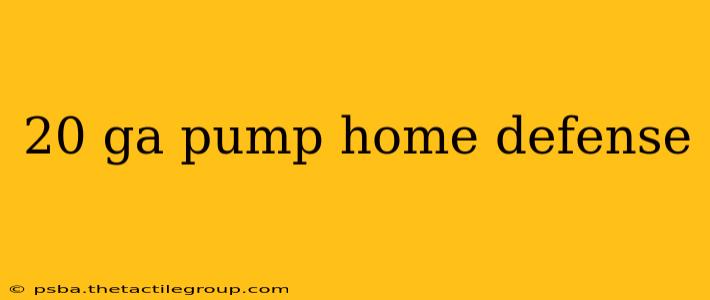The choice of a home defense firearm is deeply personal, demanding careful consideration of various factors. While many swear by the ubiquitous 12-gauge, the 20-gauge pump shotgun deserves a closer look, especially for those seeking a more manageable option. This article will delve into the pros and cons of using a 20-gauge pump shotgun for home defense.
Advantages of a 20-Gauge Pump for Home Defense
-
Reduced Recoil: This is perhaps the most significant advantage. The lighter recoil of the 20-gauge makes it easier to handle, especially for smaller or less experienced shooters. Faster follow-up shots are achievable with less muzzle climb, crucial in a high-stress situation. This reduced recoil translates to increased accuracy and control under pressure.
-
Manageability: The 20-gauge is lighter and more compact than its 12-gauge counterpart. This is beneficial for those with limited upper body strength or who need to maneuver the firearm in tight spaces within a home. Easier handling means less fatigue during extended use, which is a considerable advantage in a prolonged self-defense scenario.
-
Reduced Noise and Flash: While not as drastic a difference as the recoil reduction, the 20-gauge generally produces less noise and muzzle flash than a 12-gauge, potentially minimizing the disorienting effects of the shot for the user.
-
Ammunition Variety: While perhaps not as extensive as 12-gauge ammunition choices, there’s still a reasonable selection of 20-gauge defensive rounds available, including buckshot, slugs, and less-lethal options.
Disadvantages of a 20-Gauge Pump for Home Defense
-
Reduced Stopping Power: This is the primary drawback. The smaller gauge means less shot mass and, consequently, potentially less stopping power compared to a 12-gauge. While modern 20-gauge ammunition is effective, it may require more precise shot placement to achieve the same incapacitating effect.
-
Penetration Concerns: Depending on the ammunition chosen, penetration can be a concern. Over-penetration poses a risk to bystanders or those in adjacent areas, which is a paramount consideration in a home defense situation. Careful ammunition selection is critical to mitigate this risk.
-
Limited Availability: Compared to 12-gauge shotguns, 20-gauge shotguns and ammunition might be slightly harder to find in certain areas, particularly during periods of high demand.
Choosing the Right Ammunition
Regardless of gauge, selecting the right ammunition is critical for home defense. For a 20-gauge, consider these options:
- 00 Buckshot: A popular choice offering a good balance of stopping power and pattern density.
- Reduced Recoil Buckshot: Designed to reduce recoil while maintaining adequate stopping power.
- Slugs: Ideal for longer ranges or situations where greater penetration is necessary, but careful consideration must be given to over-penetration.
Conclusion: Is a 20-Gauge Right for You?
The 20-gauge pump shotgun offers a viable alternative to the 12-gauge for home defense, particularly for users prioritizing reduced recoil and manageable weight. However, the trade-off in stopping power and potential penetration concerns must be carefully weighed. Ultimately, the best choice depends on individual needs, shooting experience, and comfort level. Practice with your chosen firearm and ammunition is paramount to ensure proficiency and safety. Remember, responsible gun ownership involves thorough training and understanding of relevant laws and regulations. This article provides information for educational purposes only and should not be considered a substitute for professional firearms training.

